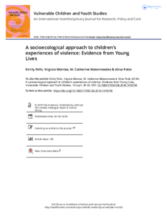childrens_living_arrangement
children_living_without_bio
Displaying 191 - 200 of 393
A cross-sectional comparative descriptive study was conducted among 300 children of age 6-12 years from a pediatric outpatient department of a selected hospital and 300 children from selected orphanages in Kolkata to compare the prevalence of behavioral disorders in children under parental care and out of parental care using Strengths and Difficulties Questionnaire (SDQ).
In this article, Newslaundry investigates six orphanages that were shut down in the Kashmir Valley owing to abuse or poor facilities.
The aim of this study was to examine associations between mindfulness and psychological factors (i.e., depression, cognitive function, positive emotion, and negative emotion) among adolescent orphans in children's care homes in India.
In this paper, the urgent need to strengthen the child protection system in India is presented in the context of the Integrated Child Protection Scheme and relevant juvenile justice legislation.
This paper highlights findings from a a 15-year longitudinal cohort study of children growing up in poverty in Ethiopia, India, Peru and Vietnam.
This paper deals with the design and development procedures involved in child protection practices in India.
This paper from the Institutionalised Children: Explorations and Beyond Special Issue on Aftercare provides an insight into the lives of two care leavers to understand their experiences in the world outside care. It brings out significant recommendations for reforms in aftercare policies for children leaving care.
This study from the Institutionalised Children: Explorations and Beyond Special Issue on Aftercare describes the mental health outcomes and transition experiences of a group of young adults who are currently transitioning (aftercare) or have already transitioned (alumni) out of a residential care organisation for orphaned and separated children (OSC) in New Delhi, India.
This study from the Institutionalised Children: Explorations and Beyond Special Issue on Aftercare was conducted on 47 young adults who had grown up in various government and non-government child care institutions of New Delhi, India and the aftercare services they did or did not receive. The analysis revealed that the existing aftercare programmes are ill-equipped to prepare Out-of-Home Care (OHC) youth to transition from alternative care to independent living.
This study from the Institutionalised Children: Explorations and Beyond Special Issue on Aftercare is aimed at studying the concept of aftercare from the prism of human rights and the international framework in context of the Convention on the Rights of the Child and the UN resolution, Guidelines for the Alternative Care of Children. Furthermore, the research is aimed at analysing the legal provisions and standards provided within the Indian legal system and how far it is attuned to the international standards.

